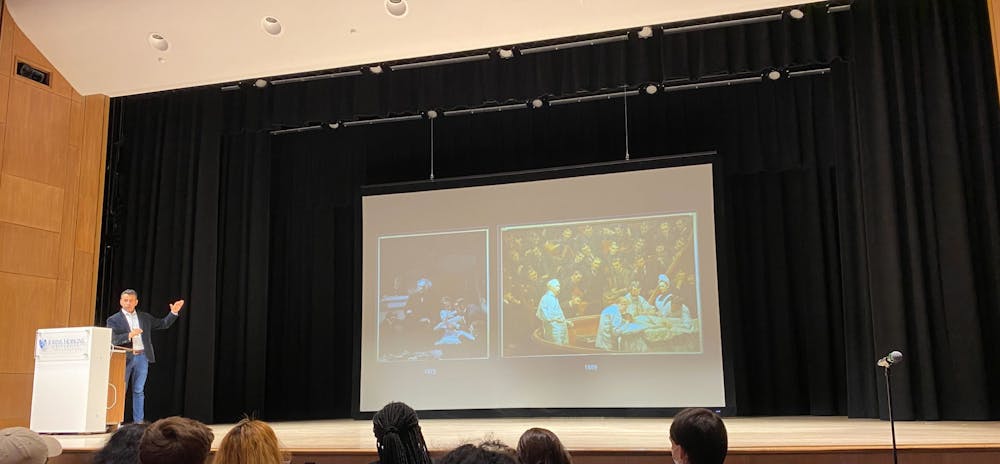The Milton S. Eisenhower (MSE) Symposium hosted Dr. Marty Makary for the fourth installment of its 2021 “Rebuilding Our Future” series on Oct. 26 in Shriver Hall. Makary is a professor at the School of Public Health practicing pancreatic surgery as well as a New York Times best-selling author.
Makary provided two reasons why many claim the American health-care system is broken: inappropriate care and pricing failures. He defined appropriate care as prescribing treatments that are more precise and personalized to each individual patient.
Makary informed his audience that medical care has become too broad and thus many patients are prescribed unnecessary medical care.
“Do you know that 10 years ago, we prescribed as a medical community 2.4 billion prescriptions, and last year it hit 5 billion? Did disease double in the last 10 years?” he said. “No, we have a crisis of appropriateness. People are on medications that are making them sick. In some fields, we have a medicalization of ordinary life.”
He claimed that the issue of inappropriate care starts in medical school in how future doctors are taught.
“The only way you can learn everything in medicine is to pair things. Learning medical vocabulary is like learning a foreign language, and as you go through school, you learn to pair things," he said. “You come out with this reflex of this is that, and you lose the sense of appropriateness.”
Makary lamented that institutions such as the National Institutes of Health (NIH) are only funding laboratory discoveries with small, incremental goals instead of lifestyle-related research.
“All the NIH is spending money on right now are the clinical pathways, the molecular pathways,” he said. “It’s so in stage, it’s so reactionary, it’s so in line with the old-school thinking in medicine to simply react when something happens.”
Makary also discussed pricing failures in medical care. He illustrated the problem with the example of purchasing an airline ticket.
“Imagine you went to buy your flight and there were no prices on the website, and instead the airlines told you collectively as an industry [that they] can’t give you a price. [They]’ll send you a bill after the flight — [it] could be $50 [or it] could be $10,000,” he said. “[They] don’t know what [the] true cost is going to be. This is exactly what happens in health care.”
Senior Jeremy Hoffner knew little about Makary before the event. In an email to The News-Letter, he wrote that he found Makary to be very engaging and knowledgeable.
“I felt that Dr. Makary did a very good job setting up the issues within the healthcare system and then laying out a comprehensive plan of action to make a course correction,” he wrote. “His experience and knowledge made the presentation very engaging, and I came away feeling empowered to help make a change, even though I do not plan to pursue a career in the medical sciences.”
Makary believes that the fundamental problem in health care is that its markets are noncompetitive. To promote price transparency, he and his team worked with President Joe Biden’s administration to create a law forcing hospitals to submit the prices of all their common services that will go into effect this January.
However, he claimed that there has been some pushback by hospitals against this law, with an overwhelming majority of hospitals replying that they will refuse to comply. Makary noted that in response, the federal government had to threaten to disclose this noncompliance to the public and issue fines as part of public accountability efforts.
Makary concluded that while the solutions to fixing the American health-care system is to give appropriate care and to fix pricing failures, he also believes that hospitals need to get back to their medical heritage.
“When American hospitals were built, they had a charter to take care of those in the community regardless of their situation. It was an amazing altruism,“ he said. “[Take] Hopkins, designed to be ‘a city on a hill’ for all the community, [for] the indigent of Baltimore regardless of [their] race, creed or ability to pay.”
In an email to The News-Letter, senior Kevin Chudy highlighted his takeaways from the talk.
“What I found most eye opening about Dr. Makary's presentation was the extent to which the entire medical system is broken from medical school to practicing medicine. Medical school curriculum focuses too much on preparing for the board exams rather than other sectors of preventative medicine,” he wrote. “Dr. Makary did a great job of summarizing and simplifying the broad problems in health care: appropriateness of care and pricing.”





